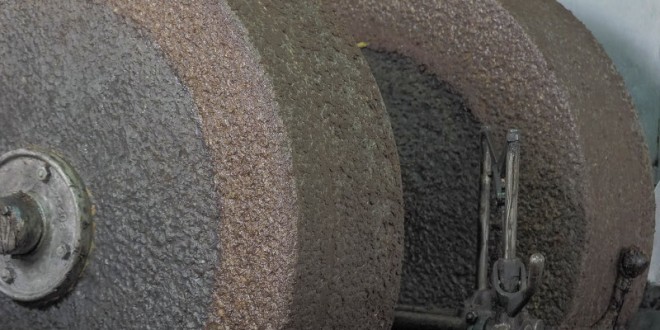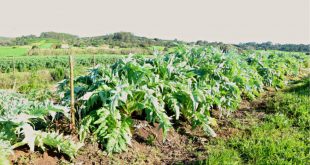Wine
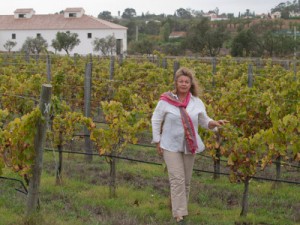 “Monte do Além” in Odiáxere (municipality of Lagos) is little known in the Algarve. However, wine-lovers in Belgium, France and Bulgaria know the name well that adorns the bottles of the precious nectar.
“Monte do Além” in Odiáxere (municipality of Lagos) is little known in the Algarve. However, wine-lovers in Belgium, France and Bulgaria know the name well that adorns the bottles of the precious nectar.
The smallholding has about six hectares of organic vines, certificated by ECOCERT, planted between 2000 and 2003, where the grape varieties cabernet sauvignon, merlot, petit verdot, syrah and aragonês flourish.
As it is impossible for a small producer of between 25,000 and 30,000 bottles to make its mark with quantity, they capture markets through their excellent value for money.
In 2012, the winery received the diploma certifying that its Petit Verdot 2009 was among the best wines produced in Portugal. It has also won a number of gold and silver medals in Algarve wine competitions at Fatacil (1).
When we asked Vinciane Nieuwenhuys, the Belgian woman who fell in love with the Algarve and invested in this project, how she succeeds in combating pests without making use of chemical products, she replies: “The fight begins during pruning. The cut branches are burnt, drastically reducing the spread of pests. As soon as the weather starts to warm up, we apply Bordeaux mixture, in the old style”.
And when would the organic wine be ready, ECO123 wanted to know.
It was explained to us that Sr Parviz, the other half of the couple and the oenologist advising the winery, is already following the norms stipulated to achieve certification, by only using sulphites, in minimal quantities. Every year in April, they are inspected and the vines are certificated. The certification of the organic wine will come in due course
1) Lagoa Fair of Handicrafts, Tourism, Agriculture, Commerce and Industry (Algarve) | http://fatacil.com.pt
MEDRONHO
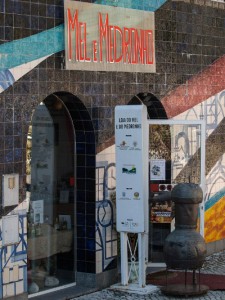 When it comes to drink, medronho brandy is the Algarve’s signature product. And the president of the association of medronho producers, vice-chancellor of the confraternity of medronho and producer of the “Monte da Lameira” brand, José Paulo Nunes, was prepared to initiate us into his production.
When it comes to drink, medronho brandy is the Algarve’s signature product. And the president of the association of medronho producers, vice-chancellor of the confraternity of medronho and producer of the “Monte da Lameira” brand, José Paulo Nunes, was prepared to initiate us into his production.
During November and December, the “medronhos”, the small red fruits of the strawberry tree, full of sugar and which intoxicate people who eat too many of them, are harvested and left to ferment, in oak or chestnut barrels, which are closed once they are full. A modern approach is also to use plastic containers with a lid to ferment the fruit without contact with the air, so as to avoid acidity. The fermentation process has to be supervised, as the quality of the must goes up and down because of the high volume of alcohol, depending on the temperature. Wood is preferred because it is thermally more stable.
In February, it is ready for the “destila”, the diminutive of distillation. With the status of small producer, each distillery can only produce up to a thousand litres of pure alcohol. As the percentage of alcohol is about 50%, they can produce about two thousand litres of medronho.
For distillation, they use copper stills with straight pipes, which are easier to clean that the spiral ones, and this also reduces the amount of copper in the drink. The quantity of copper permitted for medronho is 15 milligrams per hectolitre, but in the case of the producers in Monchique, it ranges between one and two milligrams. They use strawberry tree wood in the stove, because it produces a stable fire and they regard the 50% alcohol as being ideal for balancing the flavours of the medronho. The medronho spends a short time in wood, to become mellower, without masking the original flavours.
In the centre of Monchique, you can find the “Loja do Medronho e do Mel” (The Medronho and Honey Shop), where a different producer every day offers medronho for tasting. One of the rules of the shop is that all the brandy on sale has to be analysed, something that is done every year and with all batches by the University of Algarve.
FRESH GOAT’S CHEESE
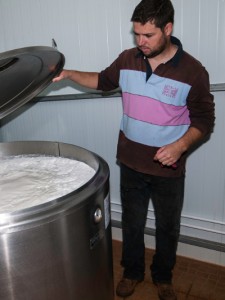
ECO123 headed for the Algarve barrocal to see fresh goat’s cheese being made. We watched the mechanical milking being done, and then we went to the small cheesery.
The milk was cooled to about 2oC. Then it was poured into another pan, seasoned with salt and pasteurised at 90oC. Next, an infusion of thistle flowers was added, in the coagulation tank, a bain-marie at 50oC, where it remained for about half an hour. In the gaps between each operation, the pans, hoses and other utensils were washed with plenty of cold water. With washing and in the bain-marie, each little cheese must consume about seven litres of water.
We are now starting on the manufacturing phase proper. The curds are cut and the whey is removed. With big sieves, the two cheesemakers start to remove the curds that were left behind, allowing the remaining water to drain away. Then they squeeze it gently with their hands to remove the rest of the whey, and place it in the moulds. The result is small cheeses weighing about 180 grams, each one the final product from about a litre of milk. After two or three hours in the cold to solidify, they will be labelled and will be ready for distribution, with a shelf life of five days.
Four years ago, 31-year-old Idálio Martins, swapped aluminium work for his passion: cheese-making. He owns 150 Andalusian goats, which produce two to three litres of milk per head; plus another 70 ready for renewing the herd. He has a dream for the future: selling fresh goat’s milk.
With production of about 400 units a day on average, five days per week, the cheese is sold in the area between Faro and Messines, but especially in Loulé. We recommend that you telephone to find out where it is sold in the area where you live.
Honey
26-year-old João Gil is a health professional, with a passion for horses. As an equine management technician, he counts as a young farmer and so was able to apply for funding to start his beekeeping business two years ago, following in his father’s footsteps.
Although he is at present just working with honey, he is hoping to move on to propolis and pollen in the near future.
According to this young beekeeper, pollen has high protein content and it is widely accepted in the medical field in Portugal and abroad as taking it can help to give energy to those need it.
“At present, I have intermediaries who buy all my honey from me and export it, although I don’t know to which countries. And my goal is to export, not only honey but also pollen,” João Gil told us.
At the moment, our interviewee has 350 hives which represent about three and a half million bees, located in the hills of Monchique and Espinhaço de Cão, producing between 12 and 15 kg of honey per hive.
When we asked him about land management, he told us that, to function well, there should be a distance of about one kilometre, or a natural or artificial barrier, between apiaries. This allows the bees to work in a radius of two to three kilometres. The quality of the honey varies with the location, the local vegetation and the time of year when it is collected, which means that the hives need to be moved strategically throughout the year.
Olive Oil
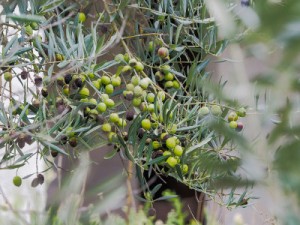 They told us in Pardieiros, close to Alferce in the heart of the Serra de Monchique, that Senhor António Santos still produces olive oil in the old manner – cold. They also told us that he loves to chat on a Sunday when he’s not working; but that, during production, he doesn’t pay attention to anyone. After they informed us on the phone that they weren’t working yet, we turned up on a Sunday without telling him in advance.
They told us in Pardieiros, close to Alferce in the heart of the Serra de Monchique, that Senhor António Santos still produces olive oil in the old manner – cold. They also told us that he loves to chat on a Sunday when he’s not working; but that, during production, he doesn’t pay attention to anyone. After they informed us on the phone that they weren’t working yet, we turned up on a Sunday without telling him in advance.
Senhor António was there, the mill was working and he barely said hello, and disappeared immediately. But we learned that he’s in his seventies and acquired the mill, which is as old as he is, about 26 years ago. And that, in contrast with most people, who want an easy life, he’s intending to keep going for another fifteen years or so.
And it’s not because of the money, which just complements his and his wife’s small pensions. It’s doing what he likes and what gives him pleasure.
We think it’s the only olive mill south of the Tagus still working in the old way: he receives the olives from small producers, produces the olive oil and hands it over. The mill owner has a right to part of the oil, which he can sell at the end, after it has been distributed. In this case at five euros per litre.
We were pleased to see the extreme cleanliness of the floor, the stainless steel and the machinery, and we watched the olives being tipped into a vat in the unloading area and being carried by a screw conveyor to a store in the mill, out of sight of the public. From there, they are sent to the mill itself, a kind of bowl with two upright mill-stones, in a rotating system. The resulting paste is put on some mats where it is pressed to get rid of the rest of the water. There, it goes to a press where it is turned into olive oil. But the process doesn’t stop there. At that moment, it is mixed with warm water, between 50o and 60o, which is necessary to help to separate the oil from the residual water and impurities. The process ends with the oil being temporarily stored in stainless steel vats, until it is collected by the clients.
HORTICULTURE AND SELLING
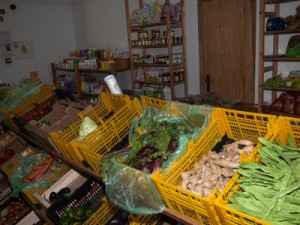
The “Horta Formosa” is located in the old part of Tavira, surrounded by houses and the salt pans. It’s what we might call an urban smallholding. Pauline from Holland and João Pedro from Portugal are a young couple with huge amounts of training and experience. She has a Master’s in organic agriculture and was a consultant in this field in the United Kingdom. He has a Master’s in rural development and gained agricultural experience in organic and biodynamic production, in addition to the production, processing and marketing of foodstuffs.
Five years ago, they rented a farm of about four hectares and started working as young farmers, producing crops in greenhouses, in the open air and fruit trees. And they also make processed items and jams to make good use of the fresh produce they can’t sell.
But from the very beginning they concentrated on selling, with a stall at the market in Olhão. At the moment, their doors are open in Moncarapacho on Tuesdays, Fridays and Saturday morning, with a family ambience where a quick chat is part of the ritual.
They also deliver every week, to their clients’ homes or workplaces: hampers with vegetables, dairy produce, bread, cereals, meat, items for hygiene and cleaning. Delivery is free, from 60 euros. Orders online or by telephone.
They are opening another shop in the centre of Tavira, to get back their old clients who they had to stop selling to because “there is no legislation for farm shops. You either start a shop from scratch with all the requirements and more, or you are semi-legal,” João Pedro told us.
Contact: Antonieta Calado
Monte do Além
Beiradas – 8600-250 Odiáxere (Lagos)
Tel. 282 799 883
Mobile 913246776
e-mail: contact@monte-do-alem.com
WEB: http://www.monte-do-alem.com
Contact: Idálio Martins Ramos
Queijaria Martins
Portela da Nave – Salir
Tel. 918 554 566
e-mail: idalioramos@gmail.com
José Paulo Nunes
Monte da Lameira
8550 Monchique
Mobile 962 702 039
e-mail: josepaulonunes@sapo.pt
ou
Loja do Mel e do Medronho
Largo 5 de Outubro
8550-424 Monchique
Pauline e João Pedro
Móvel: 962 834 679
e-mail: hortaformosa@gmail.com
WEB: www.hortaformosatavira.com
Horta Formosa Farm Gate Shop
Rua Campo de Mártires, 53-53 – Tavira
Terças e sextas-feiras 09h30 – 13h00; sábados 09h30 – 13h00
Horta Formosa Organic Shop
Rua 5 de Outubro, 17
Moncarapacho
Terças, quartas e sextas 10h00 – 13h00 e 15h00 – 18h00; sábados – 10h00 – 13h00
António Santos
Pardieiros – Alferce
8550 Monchique
Móvel: 968 121 127
 Eco123 Revista da Economia e Ecologia
Eco123 Revista da Economia e Ecologia

